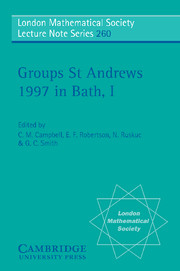Book contents
- Frontmatter
- Contents
- Contents of Volume II
- Introduction
- Radical rings and products of groups
- Homogeneous integral table algebras of degrees two, three and four with a faithful element
- A polynomial-time theory of black box groups I
- Totally and mutually permutable products of finite groups
- Ends and algebraic directions of pseudogroups
- On locally nilpotent groups with the minimal condition on centralizers
- Infinite groups in projective and symplectic geometry
- Non-positive curvature in group theory
- Group-theoretic applications of non-commutative toric geometry
- Theorems of Kegel-Wielandt type
- Singly generated radicals associated with varieties of groups
- The word problem in groups of cohomological dimension
- Polycyclic-by-finite groups: from affine to polynomial structures
- On groups with rank restrictions on subgroups
- On distances of multiplication tables of groups
- The Dade conjecture for the McLaughlin group
- Automorphism groups of certain non-quasiprimitive almost simple graphs
- Subgroups of the upper-triangular matrix group with maximal derived length and a minimal number of generators
- On p-pronormal subgroups of finite p-soluble groups
- On the system of defining relations and the Schur multiplier of periodic groups generated by finite automata
- On the dimension of groups acting on buildings
- Dade's conjecture for the simple Higman-Sims group
- On the F*-theorem
- Covering numbers for groups
- Characterizing subnormally closed formations
- Symmetric words in a free nilpotent group of class 5
- A non-residually finite square of finite groups
Totally and mutually permutable products of finite groups
Published online by Cambridge University Press: 05 August 2013
- Frontmatter
- Contents
- Contents of Volume II
- Introduction
- Radical rings and products of groups
- Homogeneous integral table algebras of degrees two, three and four with a faithful element
- A polynomial-time theory of black box groups I
- Totally and mutually permutable products of finite groups
- Ends and algebraic directions of pseudogroups
- On locally nilpotent groups with the minimal condition on centralizers
- Infinite groups in projective and symplectic geometry
- Non-positive curvature in group theory
- Group-theoretic applications of non-commutative toric geometry
- Theorems of Kegel-Wielandt type
- Singly generated radicals associated with varieties of groups
- The word problem in groups of cohomological dimension
- Polycyclic-by-finite groups: from affine to polynomial structures
- On groups with rank restrictions on subgroups
- On distances of multiplication tables of groups
- The Dade conjecture for the McLaughlin group
- Automorphism groups of certain non-quasiprimitive almost simple graphs
- Subgroups of the upper-triangular matrix group with maximal derived length and a minimal number of generators
- On p-pronormal subgroups of finite p-soluble groups
- On the system of defining relations and the Schur multiplier of periodic groups generated by finite automata
- On the dimension of groups acting on buildings
- Dade's conjecture for the simple Higman-Sims group
- On the F*-theorem
- Covering numbers for groups
- Characterizing subnormally closed formations
- Symmetric words in a free nilpotent group of class 5
- A non-residually finite square of finite groups
Summary
Only finite groups are considered here. The well-known fact that the product of two normal supersoluble subgroups of a group is not necessarily supersoluble shows that formations, even saturated, need not be closed under the product of normal subgroups. Clearly, any formation is, however, closed under direct products and even under central products. Therefore it is interesting to study factorized groups whose subgroup factors are connected by certain permutability properties. In fact, the following question can be formulated. Let the group G = HK be the product of subgroups H and K of G which lie in a formation ℱ. What is a relationship between the factors H and K -weaker than their elementwise permutability in the case of a direct product- which will guarantee G ∈ ℱ? In [1] the following results are proved:
Theorem 1Let G = HK be a group which is the product of two supersoluble subgroups H and K. If every subgroup of H permutes with every subgroup of K (we say in this case that H and K are totally permutable subgroups of G), then G is supersoluble.
- Type
- Chapter
- Information
- Groups St Andrews 1997 in Bath , pp. 65 - 68Publisher: Cambridge University PressPrint publication year: 1999
- 4
- Cited by



